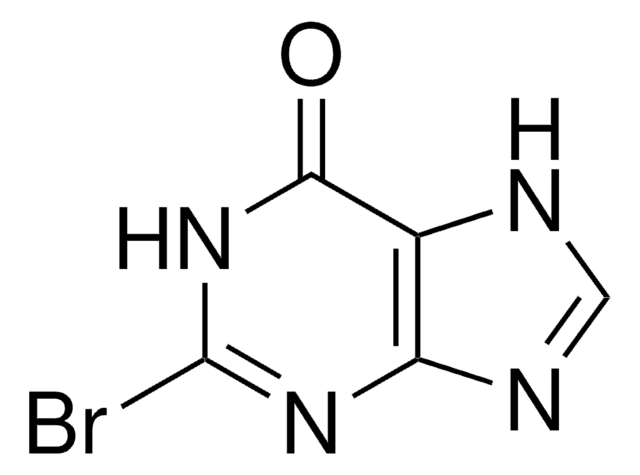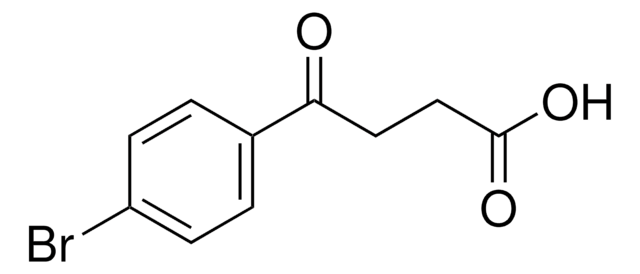All Photos(2)
About This Item
Linear Formula:
(CH3)3OCO(CH2)2CO2H
CAS Number:
Molecular Weight:
174.19
MDL number:
UNSPSC Code:
12352100
PubChem Substance ID:
NACRES:
NA.22
Recommended Products
Assay
97%
mp
51-54 °C (lit.)
functional group
carboxylic acid
ester
SMILES string
CC(C)(C)OC(=O)CCC(O)=O
InChI
1S/C8H14O4/c1-8(2,3)12-7(11)5-4-6(9)10/h4-5H2,1-3H3,(H,9,10)
InChI key
PCOCFIOYWNCGBM-UHFFFAOYSA-N
General description
mono-tert-Butyl succinate can be prepared by refluxing a mixture of succinic anhydride and N-hydroxyl succinimide in the presence of dimethylaminopyridine and triethylamine in tert-butanol and toluene.
Application
mono-tert-Butyl succinate may be used in the preparation of:
- N-succinyl-L,L-diaminopimelic acid (SDAP)
- H3K9TSu (histone H3 lysine 9 thiosuccinyl) peptide
- tert-butyl 4-oxo-4-(4-tritylpiperazin-1-yl)butanoate
Signal Word
Warning
Hazard Statements
Precautionary Statements
Hazard Classifications
Eye Irrit. 2 - Skin Irrit. 2 - STOT SE 3
Target Organs
Respiratory system
Storage Class Code
11 - Combustible Solids
WGK
WGK 3
Flash Point(F)
230.0 °F - closed cup
Flash Point(C)
110 °C - closed cup
Personal Protective Equipment
dust mask type N95 (US), Eyeshields, Gloves
Choose from one of the most recent versions:
Certificates of Analysis (COA)
Lot/Batch Number
Don't see the Right Version?
If you require a particular version, you can look up a specific certificate by the Lot or Batch number.
Already Own This Product?
Find documentation for the products that you have recently purchased in the Document Library.
Customers Also Viewed
Zinc-selective inhibition of the promiscuous bacterial amide-hydrolase DapE: implications of metal heterogeneity for evolution and antibiotic drug design.
Uda NR, et al.
Metallomics : Integrated Biometal Science, 6(1), 88-95 (2014)
Bin He et al.
Journal of the American Chemical Society, 134(4), 1922-1925 (2012-01-24)
Sirtuins, a class of enzymes known as nicotinamide adenine dinucleotide-dependent deacetylases, have been shown to regulate a variety of biological processes, including aging, transcription, and metabolism. Sirtuins are considered promising targets for treating several human diseases. There are seven sirtuins
Ying Li et al.
American journal of nuclear medicine and molecular imaging, 3(1), 44-56 (2013-01-24)
Arylboronates capture aqueous (18)F-fluoride in one step to afford a highly polar (18)F-labeled aryltrifluoroborate anion ((18)F-ArBF(3) (-)) that clears rapidly in vivo. To date however, there is little data to show that a ligand labeled with a prosthetic (18)F-ArBF(3) (-)
Our team of scientists has experience in all areas of research including Life Science, Material Science, Chemical Synthesis, Chromatography, Analytical and many others.
Contact Technical Service

![1,5,7-Triazabicyclo[4.4.0]dec-5-ene 98%](/deepweb/assets/sigmaaldrich/product/structures/171/446/333d560c-cff6-4958-b489-5acfb3057cce/640/333d560c-cff6-4958-b489-5acfb3057cce.png)









